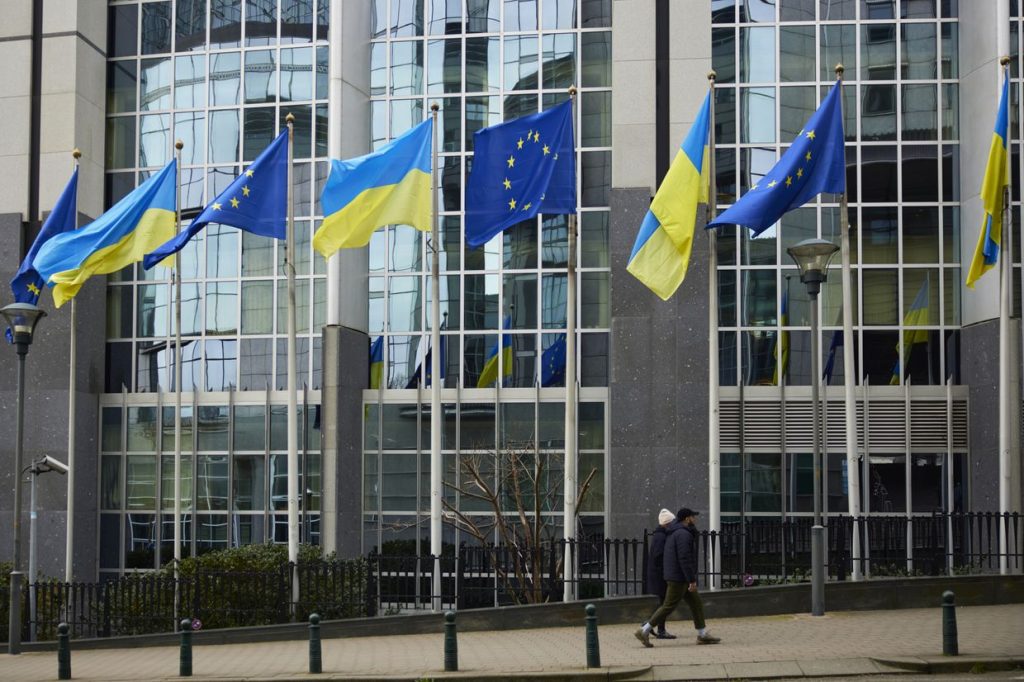Hungary is currently preventing a consensus among EU members on the start of Ukraine’s accession talks. The European Commission supported the start of these talks on June 7, but for talks to commence, the EU needs unanimous agreement that Ukraine has addressed issues such as corruption and the protection of minority languages. Budapest has been expressing concerns about discrimination against the Hungarian ethnic minority in southwestern Ukraine due to Kyiv’s language laws. Ukraine denies these allegations and updated its national minorities law at the end of 2023 in accordance with EU recommendations. Despite the Commission’s positive assessment, Hungary is insisting that certain conditions must be met before they can accept the start of talks. The discussion on Ukraine’s accession will continue, with some sources suggesting that Budapest may compromise to allow progress for other Western Balkan countries as well.
EU and Ukrainian officials are eager for the accession talks to begin by June 25, before Hungary assumes the presidency of the EU Council in July. Relations between Kyiv and Budapest have been strained, especially during the full-scale war, as Hungary maintained close ties with Russia and impeded aid to Ukraine, as well as sanctions against Moscow. The European elections taking place between June 6 and June 9 will have a substantial impact on EU domestic and foreign policy. The election of the bloc’s 720-member European Parliament may influence decisions related to EU aid and accession talks with Ukraine. Despite some voters downplaying the significance of these elections, they are crucial for shaping the future direction of the EU and its relationships with countries like Ukraine.
The issue of the Hungarian ethnic minority in Ukraine remains a key sticking point in the accession talks. Hungary insists that discrimination against this minority must be addressed before talks can commence. The EU’s unanimous agreement on Ukraine’s progress is necessary for the talks to start, and Budapest’s conditions have been a major hurdle in reaching this consensus. It is crucial for Ukraine to show a commitment to improving the situation of minority groups within its borders in order to pave the way for successful accession talks with the EU. The ongoing discussions between EU members and Ukrainian officials reflect the complex dynamics at play in this process.
The European Commission’s endorsement of the start of accession talks with Ukraine indicates a positive step towards deeper integration between the country and the EU. Despite the challenges posed by Hungary’s reservations, there is a strong push from both EU and Ukrainian representatives to move forward with the talks. The potential compromise from Budapest for progress on the Western Balkan countries could open up the pathway for Ukraine and Moldova as well. The upcoming discussions and negotiations will be crucial in determining the timeline and conditions for Ukraine’s accession talks to officially begin. It is a significant moment for Ukraine’s European aspirations and its ongoing efforts to align with EU standards and principles.
The broader implications of Ukraine’s accession talks extend beyond just the country itself. The EU’s approach to admitting new member states reflects its values, principles, and priorities in engaging with neighboring countries. The outcome of these talks will not only shape Ukraine’s future relationship with the EU but also impact the overall stability and security of the region. The continued support for independent journalism in Ukraine and the coverage of these developments are essential in providing transparent and accurate information to the public. By staying informed and engaged, individuals can contribute to the ongoing discussions and decisions that will ultimately determine the course of Ukraine’s integration with the EU. The importance of unity and cooperation among EU members in this process cannot be overstated, as it will require consensus and collective action to address the challenges and opportunities that come with Ukraine’s potential accession.


